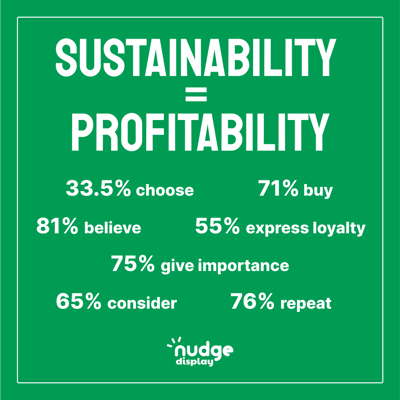Sustainability = Profitability
SUSTAINABILITY
10/16/20232 min read


In the ever changing landscape of consumer behaviour, individuals are making choices that significantly impact the business world. This evolution of customer behaviour isn't solely about making purchases: it's about making a statement. It involves selecting brands that align with personal values, particularly those that prioritize sustainability and social responsibility.
Consumers today seek more than just products; they crave a deeper connection with the brands they support. This connection often stems from conscious sustainability choices, resulting in increased loyalty. The interplay between customer loyalty and brand positioning defines the dawn of a new era in business success.
Research findings back this evolution of values-driven consumer behaviour
According to a survey by Unilever, a remarkable 33.5% of consumers actively choose to buy from brands they believe are making a positive social or environmental impact. (Source: Unilever Survey)
The 2020 Edelman Trust Barometer reveals that a substantial 65% of consumers now consider a brand's sustainability efforts when deciding whether to make a purchase. (Source: Edelman Trust Barometer)
Nielsen's Global Sustainability Report highlights that a whopping 81% of consumers passionately believe that companies should play a role in improving our environment. (Source: Nielsen's Sustainability Report)
The Future Shopper Report by Wunderman Thompson Commerce shows that 55% of consumers in the United States express loyalty to brands that actively work to reduce their environmental impact. (Source: Wunderman Thompson Commerce Study)
Research by IBM and the National Retail Federation reveals that an overwhelming 71% of consumers are more likely to buy from a retailer that is committed to sustainability. (Source: IBM and National Retail Federation Study)
The Carbon Trust's study found that an impressive 76% of consumers in the United Kingdom are more likely to make repeat purchases from companies that demonstrate a commitment to reducing their carbon footprint. (Source: Carbon Trust Study)
A report by the World Economic Forum states that an astounding 75% of Gen Z thinks sustainable purchases are more important than brand names. (Source: World Economic Forum Report)
It's clear that sustainability and profitability are not opposing forces; they are intertwined, driving enhanced brand equity, repeat purchases, and a positive impact on loyalty. Embracing sustainability isn't just a step in the right direction; it's the path to long-term success and a brighter, more sustainable future for us all.
Terms and Conditions
Copyright 2025. All rights reserved.
